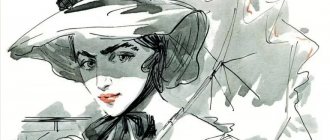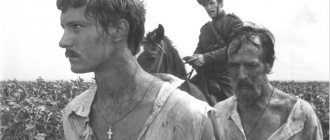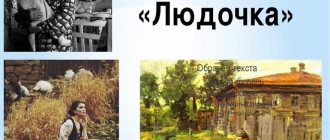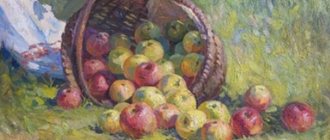About the product
The story “Two Landowners” by Turgenev was written in 1852. It was included in the famous series “Notes of a Hunter,” which the author dedicated to describing the life of serfs and landowners of the mid-19th century. The work shows the most typical images of Russian landowners.
To better prepare for a literature lesson, we recommend reading the online summary of “Two Landowners” on our website. You can test your knowledge using a special test.
The material was prepared jointly with the highest category teacher Lyubov Alexandrovna Koroshchup.
Experience as a teacher of Russian language and literature - 30 years.
Heroes
Turgenev gives a detailed description of his characters, describing their appearance, home, habits, actions, character and speech. Like Gogol, who created a gallery of landowners in Dead Souls, Turgenev, based on his task, makes the second landowner more lost and morally hopeless than the first. It is difficult to even understand whether Turgenev uses the grotesque as a method of ridiculing the landowners or whether such outlandish people were actually found in Rus' in the mid-19th century.
Khvalynsky's appearance is ambiguous. On the one hand, the author calls him a man “in adulthood, at the very... pores,” on the other hand, it is reported that he is missing some teeth, his cheeks are sagging, he himself is flabby, and his sparse hair has changed color. Judging by the hero’s clothes, we can conclude that he strives to look dandy.
Khvalynsky is called a very kind man, but his habits tell a different story: in conversations with lower ranks, he swallows words contemptuously, strives for honor, but refuses the title of leader, because this requires action! In short, the general is strong where he needs to make an impression.
Turgenev speaks skeptically about the intelligence of Khvalynsky, who reads books only in front of guests and avoids arguments, especially with young people. Khvalynsky is a curmudgeon and does not know how to run a farm, but his neighbors consider him an excellent landowner, a selfless person, “with rules.”
Compared to him, Stegunov (his last name is also telling, he takes pleasure in whipping his serfs) seems open and sincere. He is naturalness itself, does not try to seem like something else. Stegunov did not serve anywhere, he is a short, plump old man with a paunch. His clothes are a striped dressing gown with cotton wool. His life is patriarchal. His house is similar to many houses of other landowners, where books are forgotten, people are dressed in the old way, and traditionally address guests. Stegunov is hospitable.
It is not without reason that Turgenev emphasizes several times that his hero does nothing. Such idleness leads to moral perversions, which are manifested in catching other people's chickens on his plot (the landowner asks five times in a row whose chickens are walking on his plot), persecution of serfs or corporal punishment.
Summary
The narrator decided to tell about his two landowner neighbors, with whom he often hunted. These were respectable people who enjoyed “the universal respect of several counties.” One of them, Vyacheslav Illarionovich Khvalynsky, was a retired major general. He was a tall, once slender, but now flabby man “in his prime, as they say.” His appearance had already undergone annoying age-related changes, but Khvalynsky was still cheerful, cheerful and often called himself an “old cavalryman.”
He was, in essence, a kind man. However, he could not communicate on equal terms with “nobles who were not rich or not of high rank.” When talking to them, Khvalynsky looked askance, disdainfully. And, on the contrary, with people higher than him in social status or rank, he was particularly respectful, and even lost to them at cards with an amiable smile, without complaint. The general did not like to talk about his service, and “it seems he had never been to war either.”
In addition, “Vyacheslav Illarionovich is a terrible hunter of the fair sex,” and at the sight of a pretty person he was always ready for exploits. He had no family, and he was still considered an eligible bachelor. General Khvalynsky was surprisingly good “at all ceremonial and public events, examinations, meetings and exhibitions,” where he was gladly invited. However, he invariably avoided long conversations and heated arguments. He did not receive anyone at home and lived, “as you can hear, as a miser.”
Another landowner, Stegunov Mardarii Apollonych, was completely different. The only thing he had in common with Khvalynsky was that both were confirmed bachelors. Short, bald, plump, Stegunov “hardly served anywhere and was never considered handsome.” He was a great hospitable person and joker, he always received guests with pleasure and treated them with all his heart. Mardarii Apollonych himself did nothing and became so lazy that “even the Dream Book stopped reading.”
One day the narrator came to visit Stegunov. They sat on the balcony, drank tea and enjoyed a wonderful evening. Suddenly the sounds of blows were heard. Mardarii Apollonych said that it was on his orders that “the little naughty boy”, the barman Vaska, was being punished. When on the way back the narrator met that same Vaska, he asked why he was beaten. The barman replied that he received the punishment for the deed. He admired the kind and fair master, the kind “you won’t find in the whole province.” The narrator sighed sadly and thought about the sad fate of the ordinary Russian people.
The plot of the story “Two Landowners” by Turgenev
“Two Landowners” Turgenev summary of the work:
Let me introduce you to two landowners with whom I often hunted. The first of them is retired Major General Vyacheslav Illarionovich Khvalynsky. Tall and once slender, he was now not at all decrepit.
True, the once regular features of his face have changed a little, his cheeks have drooped, wrinkles have appeared, but Vyacheslav Illarionovich speaks smartly, laughs loudly, jingles his spurs and twirls his mustache. He is a very kind person, but with rather strange habits. He cannot treat poor nobles as equals; even his speech changes.
He was a troublemaker and a terrible man, and a bad owner: he took a retired sergeant, an unusually stupid man, as his manager. Khvalynsky is a big lover of women. He only likes to play cards with people of lower rank.
When he has to play with his superiors, he changes a lot and doesn’t even complain about losing. Vyacheslav Illarionovich reads little; when reading, he constantly moves his mustache and eyebrows. He plays a significant role in the elections, but due to stinginess he refuses the honorary title of leader.
General Khvalynsky does not like to talk about his military past. He lives alone in a small house and is still considered a profitable groom. His housekeeper, a plump, fresh-faced, black-eyed and black-browed woman of about 35, wears starched dresses on weekdays. At large dinner parties and public celebrations, General Khvalynsky feels at ease. Khvalynsky does not have a special gift for words, so he does not tolerate long arguments.
Mardarii Apollonych Stegunov is similar to Khvalynsky in only one way - he is also a bachelor. He did not serve anywhere and was not considered handsome. Mardarius Apollonych is a short, plump old man, bald, with a double chin, soft arms and a belly. He is a hospitable and joker, lives for his own pleasure.
Stegunov deals with his estate rather superficially and lives in the old way. His people are dressed in the old-fashioned way, the farm is run by a mayor of men, and the house is run by a wizened and stingy old woman. Mardary Apollonych welcomes guests cordially and treats them to delight.
One day I came to see him on a summer evening, after the all-night vigil. After Stegunov dismissed the young priest, treating him to vodka, we sat on the balcony. Suddenly he saw strange chickens in the garden and sent the yard servant Yushka to drive them out. Yushka and three other servants rushed at the chickens, and fun ensued. It turned out that these were Ermil the coachman’s chickens and Stegunov ordered them to be taken away.
Then the conversation turned to the settlements, which were given a bad place. Mardarii Apollonych said that disgraced men live there, especially two families who cannot be removed. In the distance I heard strange sounds. It turned out that they were punishing Vaska the barman, who served us at lunch.
A quarter of an hour later I said goodbye to Stegunov. Driving through the village, I met Vasya and asked why he was punished. He replied that they were punished for the deed, and such a master as theirs could not be found in the whole province.
Turgenev wrote the story “The Burmist” in July 1847. The essay was included in the writer’s famous cycle “Notes of a Hunter.” On our website you can read a brief summary of “The Burmistr”, which is suitable for preparing for a lesson in Russian literature, for a reader’s diary.
The history of the creation of Notes of a Hunter
The work “Two Landowners,” a brief summary of which allows us to evaluate the events of Russian reality in the nineteenth century, is included in Turgenev’s “Notes of a Hunter” cycle.
It is known that in 1837 Turgenev graduated from the philological faculty of St. Petersburg University. And the very next year, despite the fact that he was only nineteen years old, he went to study in Berlin. This is how his dream came true, since he was not only tired of the landowner environment, to which the author himself belonged, but aroused indignation and disgust in him.
And only in 1841 he returned to his homeland and immediately published his first work. The critic Belinsky highly praised his poem “Parasha”. This is how Turgenev’s writing career began. And in 1847, when the first issue of the Sovremennik magazine was published, he published the story “Khor and Kalinich” in it, although he had no intention of publishing this essay at all.
Panaev, who was one of the founders of the magazine, also added a subtitle to the essay: “From the Notes of a Hunter,” although the author no longer had any manuscripts. But the essay was a great success, and soon readers demanded a continuation of “Notes of a Hunter.” And then Ivan Sergeevich decided to continue this cycle of stories. In 1847 he went abroad again.
In separation from the Motherland, love for one’s country grew stronger. He recalled his childhood and how he hunted in the Tula and Oryol provinces. These bright sides of Russian life gave him strength for creativity, and work on the new cycle continued. Subsequently, the stories were also published in the Sovremennik magazine; there were twenty-one of them.
The collection of stories “Notes from Hunters” was published as a separate book only in 1852, but only the twenty-second story was added to the previously published works. It became “Wild Landowner” . Three more stories were later written:
- "Knocks."
- "The End of Tchertopkhanov."
- "Living Relics".
In 1880, a new edition of the book “Notes of a Hunter” was published, which already contained twenty-five stories.
Artistic chronicle of a fortress village
In the collection of stories, Ivan Turgenev showed the main character, a peasant who has enormous spiritual powers. Russian society appreciated Turgenev's new work as a preaching of the liberation of the peasants. All the stories that were collected into one work negatively described the life of the landowners.
Many writers have expressed their admiration for Notes of a Hunter. Ivan Goncharov wrote that this collection of stories helped him write. The French writer Alphonse Daudet called this Turgenev work “the book of the great novelist.” Maxim Gorky spoke about how greedily he read Turgenev's work and how deeply it influenced him.
Brief retelling
The essay is short. For the most part, he describes the landowners themselves and gives them characteristics. The plot begins to develop only in the second half of the text .
One summer evening the narrator comes to Stegunov. The owner was delighted with the visit. At this time, a young priest was already visiting him, but Stegunov hastened to get rid of him, forcing him to drink vodka.
Next, the narrator and the owner went out onto the balcony and started a conversation. The landowner saw that three strange chickens were walking in his garden. The servants began to catch the birds. To help them, Natalka, the coachman’s daughter, jumped over the fence into the garden. Stegunov ordered to catch the girl and sincerely admired the turmoil that arose as a result of the chase.
Then the main characters moved on to drinking tea. The narrator asked the owner why several households had been evicted. Stegunov explained that “unworthy” peasants live in them, who are in disgrace with the owner, just as their fathers were in disgrace under Stegunov’s late father. Then blows were heard from the stable - there they were punishing the naughty bartender Vasya with a whip.
Going home, the narrator met the aforementioned Vasya in the village. He calmly gnawed the nuts, and when questioned, he answered that the master had punished him fairly.
Main and secondary characters
The narrative is built around the narrator's two neighbors. They are both landowners, live near the author and are friends with him. Everyone often goes hunting together.
The landowners' names are:
- Mardariy Apollonych Stegunov;
- Vyacheslav Illarionovich Khvalynsky.
Retired General Khvalynsky is tall and stately, as befits a military man, but he is already a little flabby and has lost several teeth. Vyacheslav Illarionovich is not an evil person, but he hardly notices the needs of his peasants. Despite strict discipline, his farm is poorly managed and is dying.
The second hero is Mardarii Apollonych Stegunov. He is an absolutely civilian man, far from the army, with a plump physique and a bald head. Mardarii Apollonych is hospitable, willingly receives guests and feeds them to their heart's content. In addition, he loves the old life and, unlike Khvalynsky, cannot stand the new order.
The text contains minor characters:
- an important St. Petersburg official - it is indirectly mentioned how he ordered the sowing of poppies instead of wheat and the wearing of city kokoshniks for serf women;
- a young priest who recently graduated from seminary;
- Yushka is an old man about 80 years old, a servant of Mardaria Appolonych;
- Natalka is the daughter of Ermila the coachman, a girl of 11 years old;
- housekeeper Avdotya;
- Vasya the bartender.
Analysis of the story “Two Landowners” by Turgenev shows the negative impact of serfdom on a person. Lack of freedom kills dignity not only in peasants, but also in their owners. Already from the description of the appearance, behavior and lifestyle of Stegunov and Khvalynsky, one can see the author’s efforts to convey to readers the idea that the people who control the peasants are worthless. They are unable to create positive change because they are not educated.
The landowners not only do not want, but even cannot make life easier for the peasants.
The main idea of the work
The author openly ridicules the main characters. They spend their days meaninglessly and aimlessly, bringing no benefit to themselves or others. An empty and worthless life does not depress them. On the contrary, they are considered worthy and respected people. This suggests that the rest and the owners of the area are a match for the main characters.
Turgenev depicted two main types of representatives of the landowner class:
- a military man who has retired and does not have any military merit, since his service occurred in peacetime;
- a civilian - poorly educated, who received power over people only by birthright.
The summary of “Two Landowners” shows the author’s intention: he wanted to describe the life of the Russian province during serfdom and show that the difficult situation of the peasants is also due to incompetent management . Turgenev reveals the theme of the terrible life of the Russian people in slavery, and shows how bondage deforms the peasants themselves and their masters.
After reading the summary and analysis of Turgenev’s work “Two Landowners,” it is recommended that you read it yourself. This will help to appreciate the richness of the Russian language, thanks to which the author aptly conveyed the character and lifestyle of the provincial inhabitants.





